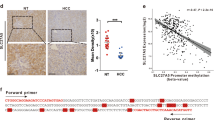Abstract
Sphingosine kinase 1 (SphK1) is an oncogenic enzyme promoting transformation, proliferation, and angiogenesis of a number of human tumors. However, its effect on hepatocellular carcinoma (HCC) behavior has not been fully clarified. The purpose of this study was to determine the correlation between HCC and SphK1, and to evaluate the effect of SphK1 inhibitor N,N-dimethylsphingosine (DMS) in HCC. The expression of SphK1 was measured in tissue samples from 76 HCC and paired adjacent noncancerous liver tissues (NT) by immunohistochemistry, quantitative real-time PCR, and Western blotting analysis. The effect of DMS was tested on HCC cells by evaluating cell viability in vitro. Transwell cell migration and invasion assay were carried out for functional analysis. Furthermore, Western blotting analysis was performed to examine the impact of DMS on the PI3K/Akt/NF-kB signaling. High expression of Sphk1 was observed in 84.21 % (64/76) of the HCC versus 15.79 % (12/76) of the adjacent non-tumorous liver tissues; the difference of Sphk1 expression between HCC and the adjacent non-tumorous liver tissues was statistically significant (P < 0.001). The results were confirmed by Western blot analyses and quantitative real-time PCR. DMS inhibited the proliferation of SK-Hep1 and MHCCLM3 cells which have a relatively high level of SphK1 in a time- and concentration-dependent manner, and the invasion and migration of SK-Hep1 cells were distinctly suppressed after undergoing treatment with DMS. Furthermore, DMS markedly suppressed the expression of phosphorylations of Akt and NF-κB in HCC cells. Our data suggest that the pathogenesis of human HCC maybe mediated by Sphk1, and the specific Sphk1 inhibitor DMS can play a therapeutic role in the treatment of HCC and thus, Sphk1 could represent selective targets for the molecularly targeted treatments of HCC.






Similar content being viewed by others
References
Jemal A, Bray F, Center MM, Ferlay J, Ward E, Forman D. Global cancer statistics. CA Cancer J Clin. 2011;61(2):69–90.
Ades S. Adjuvant chemotherapy for colon cancer in the elderly: moving from evidence to practice. Oncology (Williston Park). 2009;23(2):162–7.
Frangov T, Gaĭdarski R, Dimitrova V, Popov V, Grozeva K, Rusenov D. [Prognostic factors for survival in primary liver cancer]. Khirurgiia (Sofiia). 2007;(6):36–9.
Song L, Xiong H, Li J, Liao W, Wang L, Wu J, et al. Sphingosine kinase-1 enhances resistance to apoptosis through activation of PI3K/Akt/NF-κB pathway in human non-small cell lung cancer. Clin Cancer Res. 2011;17(7):1839–49.
Pitson SM, Powell JA, Bonder CS. Regulation of sphingosine kinase in hematological malignancies and other cancers. Anticancer Agents Med Chem. 2011;11(9):799–809.
Block TM, Mehta AS, Fimmel CJ, Jordan R. Molecular viral oncology of hepatocellular carcinoma. Oncogene. 2003;22:5093–107.
Tang ZY, Ye SL, Liu YK, Qin LX, Sun HC, Ye QH, et al. Adecade’s studies on metastasis of hepatocellular carcinoma. J Cancer Res Clin Oncol. 2004;130:187–96.
Yang Y, Nagano H, Ota H, Morimoto O, Nakamura M, Wada H, et al. Patterns and clinicopathologic features of extrahepatic recurrence of hepatocellular carcinoma after curative resection. Surgery. 2007;141:196–202.
Nava VE, Hobson JP, Murthy S, Milstien S, Spiegel S. Sphingosine kinase type 1 promote sestrogen-dependent tumori-genesis of breast cancer MCF-7 cells. Exp Cell Res. 2002;281:115127.
Kapitonov D, Allegood JC, Mitchell C, Hait NC, Almenara JA, Adams JK, et al. Targeting sphingosine kinase 1 inhibits Akt signaling, induces apoptosis, and suppresses growth of human glioblastoma cells and xenografts. Cancer Res. 2009;69:6915–23.
Pchejetski D, Doumerc N, Golzio M, Naymark M, Teissi J, Kohama T, et al. Chemo-sensitizing effects of sphingosine kinase-1 inhibition in prostate cancer cell and animal models. Mol Cancer Ther. 2008;7:1836–45.
Schwartz GK, Ward D, Saltz L, et al. Apilot clinical/pharmacological study of the protein kinase C-specific inhibitor safingol alone and incombination with doxorubicin. Clin Cancer Res. 1997;3:537–43.
Nava VE, Cuvillier O, Edsall LC, et al. Sphingosine enhances apoptosis of radiation-resistant prostate cancer cells. Cancer Res. 2000;60:4468–74.
Liu H, Sugiura M, Nava VE, et al. Molecular cloning and functional characterization of a novel mammalian sphingosine kinase type 2 isoform. J Biol Chem. 2000;275:19513–20.
Chen K, Pan QW, Gao Y, et al. DMS triggers apoptosis associated with the inhibition of SPHK1/NF-B activation and increase in intracellular Ca2+ concentration in human cancer cells. Int J Mol Med. 2014;33:17–24.
Author information
Authors and Affiliations
Corresponding author
Additional information
The Publisher and Editor retract this article in accordance with the recommendations of the Committee on Publication Ethics (COPE). After a thorough investigation we have strong reason to believe that the peer review process was compromised.
An erratum to this article is available at http://dx.doi.org/10.1007/s13277-017-5487-6.
About this article
Cite this article
Zhang, Z., Yan, Z., Yuan, Z. et al. RETRACTED ARTICLE: SPHK1 inhibitor suppresses cell proliferation and invasion associated with the inhibition of NF-κB pathway in hepatocellular carcinoma. Tumor Biol. 36, 1503–1509 (2015). https://doi.org/10.1007/s13277-014-2665-7
Received:
Accepted:
Published:
Issue Date:
DOI: https://doi.org/10.1007/s13277-014-2665-7




